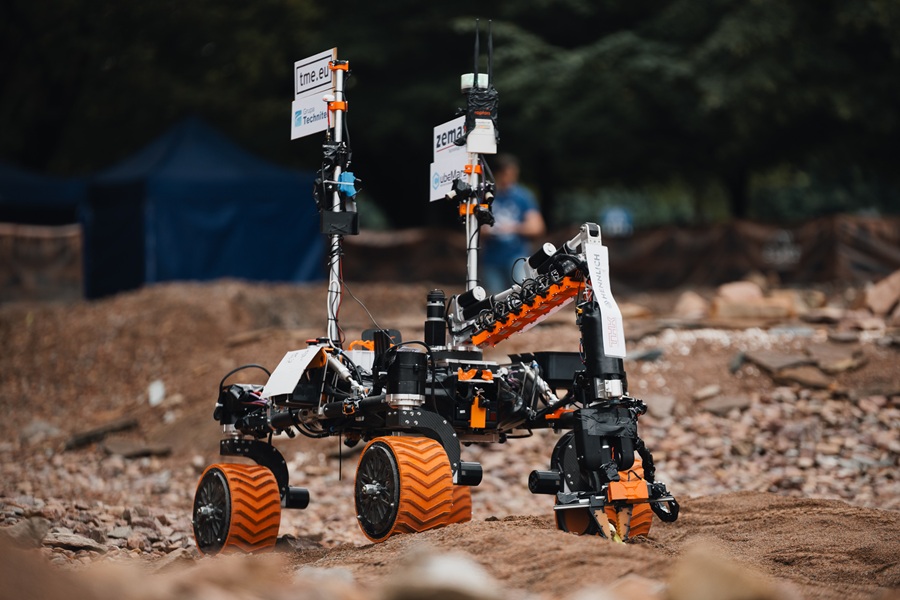Three days of thrilling competition, dozens of teams from around the world, and one goal: to find out which design performs best in conditions inspired by real space missions. This was the grand finale of the 11th edition of the European Rover Challenge (ERC), the largest space and robotics event in Europe. On the campus of AGH University in Kraków, engineering students from across continents faced tasks that in the future may be carried out by robots exploring Mars and the Moon. After an intense rivalry, victory went to the team from the Swiss Federal Institute of Technology in Lausanne.
The European Rover Challenge is the largest international Mars rover competition in Europe, held annually in Poland. The best academic teams from around the globe take part, testing their rovers in tasks inspired by real space missions. In this year’s edition, 25 teams competed, selected from over 100 applications from universities in countries including Poland, Spain, Denmark, Germany, the United Kingdom, Italy, India, Egypt, and Turkey. The final round featured as many as five Polish teams, once again confirming the high level of Polish engineering.
This year’s winner was the Swiss team EPFL Xplore, representing the Swiss Federal Institute of Technology in Lausanne, which achieved the highest overall score and impressed the jury with the precision and innovativeness of its design. Second place went to STAR Dresden e.V., representing Dresden University of Technology, while the hosts, AGH Space Systems from AGH University, secured third place.
Earth-based Mars Missions
The tasks faced by the teams were inspired by real challenges encountered daily by specialists from space agencies. The robots had to autonomously explore terrain, collect and secure samples for astrobiological analyses, perform precise servicing operations, and even collaborate with drones to search for objects in difficult environments. It was a test of both technology and teamwork.
‘The competition was incredibly close, and its level rises year by year. It is a pleasure to see how we are shaping the next generations of engineers – both among the participants and the youngest spectators. ERC is the only event in Europe that brings together the academic community, engineers, and the space industry with the wider public. Our event has become a permanent fixture in the space sector’s calendar and a space where science, technology, and education come together in practice’, said Łukasz Wilczyński, President of the European Space Foundation, organizer of the ERC.
Poland Still Among the Leaders
Polish teams formed a strong representation – as many as five qualified for the final. The best among them was the team from AGH University in Kraków, which secured third place on the podium. This is yet another proof that Polish students continue to maintain a world-class level in space engineering and mobile robotics.
‘For our university, the European Rover Challenge is more than just a competition – it is a true celebration of science and technology. We are delighted to have hosted young engineers from around the world here in Kraków and to witness how their innovative solutions perform in conditions inspired by space missions. This event not only enables students to develop future-oriented skills but also inspires thousands of spectators, especially young people, to discover the fascinating world of science and new technologies. For AGH, the opportunity to co-organize ERC and contribute to the development of the space sector is a great source of pride’, emphasized Prof. Jerzy Lis, Rector of AGH University in Kraków.
Science, Passion, and Business in One Place
ERC is not only a rover competition. The event was accompanied by a science conference, this year divided into three thematic blocks: Earth, Moon, and Space. The audience had the chance to hear from experts representing ESA, the Space Research Centre of the Polish Academy of Sciences (CBK PAN), ispace Europe, as well as many technology companies. Topics included the circular economy, the Artemis program missions, space and digital medicine, and missions to the International Space Station planned for 2026.
For all seekers of technological innovations and astronomy enthusiasts, regardless of age or level of knowledge, there was a scientific exhibition zone – a space full of experiments, educational workshops, and demonstrations of robots and 3D printing. ERC is also a business meeting point – companies and start-ups establish contacts with partners and learn how to secure funding for their projects. Thanks to this, the event has become a place where science, business, and the wider public meet every year.
Organizers and Partners
The organizer of ERC 2025 was the European Space Foundation, with AGH University of Kraków serving as co-organizer. The Małopolska Region acted as Regional Partner, while the City of Kraków served as Host City.
The event was held under the honorary patronage of the Minister of Education, the Minister of Science and Higher Education, the Marshal of the Małopolska Region, the Mayor of Kraków, and the Polish Space Industry Association.
Partners included, among others: the U.S. Consulate in Kraków, the Polish Space Professionals Association, Mars Society Polska, the Polish Space Agency, MathWorks, DPS Software, the Polish Tourism Organization, the Poland Convention Bureau, and Business in Małopolska Center. The project was financed with state budget funds granted by the Minister of Education and Science under the ‘Social Responsibility of Science II’ program.
******
European Rover Challenge (ERC) – a recurring international Mars rover competition organized in Poland – attracts leading academic teams from many countries each year. ERC is the largest platform in Europe where the scientific and technological communities meet with the general public, combining technology demonstrations with the popularization of science and business. The inaugural edition took place in 2014.
More details are available at www.roverchallenge.eu.

